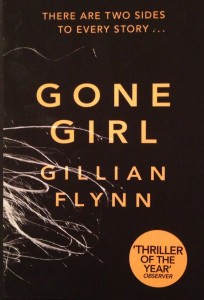 Via Galleycat came this news, that Amazon has put out a new list of mystery books to supplement their ‘100 Books to Read in a Lifetime’ feature. The books run the gamut from classic to modern, more genre-ish to literary. Of the 100 listed titles, I’ve read about a quarter.
Via Galleycat came this news, that Amazon has put out a new list of mystery books to supplement their ‘100 Books to Read in a Lifetime’ feature. The books run the gamut from classic to modern, more genre-ish to literary. Of the 100 listed titles, I’ve read about a quarter.
As is typical of such lists, debate will likely rage over the included titles. Gillian Flynn’s trendy [easyazon-link asin=”B006LSZECO” locale=”us”]Gone Girl[/easyazon-link] over her vastly superior earlier work, [easyazon-link asin=”B0027MJU00″ locale=”us”]Dark Places[/easyazon-link]? Mary Higgins Clark? Really?
Anyway, if you’re looking for somewhere to get started, here are my top 5 favs from the list:
– [easyazon-link asin=”B004GUSG4M” locale=”us”]Before I Go To Sleep[/easyazon-link] by S.J. Watson: A woman with amnesia tries to reconstruct the mystery of her life. The catch? She can’t form new memories either, so she has to get caught up to speed on her progress via a daily journal which slowly builds clues.
– [easyazon-link asin=”0060777095″ locale=”us”]Get Shorty[/easyazon-link] by Elmore Leonard: I have never been a huge Leonard fan, but my dad worships this guy and says he is one of the best contemporary noir authors there is. This is his most known title.
– [easyazon-link asin=”0062073486″ locale=”us”]And Then There Were None[/easyazon-link] by Agatha Christie: A mystery classic wherein a pool of suspects is killed off one by one, eliminating them from contention as the murderer.
– [easyazon-link asin=”0380730405″ locale=”us”]Rebecca[/easyazon-link] by Daphne du Maurier: A woman is curious about her husband’s first wife. There is more to it than that, of course, and I wouldn’t say this is a mystery novel in the classic sense, but the twist ending blew my mind when I first read it years ago.
– [easyazon-link asin=”1400034779″ locale=”us”]The No. 1 Ladies’ Detective Agency[/easyazon-link] by Alexander McCall Smith: A charming series featuring a lady detective who lives and works in Botswana.































I’d take this list more seriously if Amazon’s business practices didn’t display such contempt for authors and thus the books they create. The best illustration of that lies in Amazon’s complex and Scrooge-like royalty rates for ebooks. Note the differences:
* Apple pays a flat 70% royalty at all prices from $0.99 to $199.99 and charges not download fee. It varies, but typically, Smashwords pays even better for direct sales than Apple.
* Amazon only pays that 70% royalty for books over a narrow price range, $2.99-$9.99. Outside that range it pays only 35%, which a dreadful half as much. Inside that range it also charges download fees that are the equivalent of selling an ordinary hamburger for about $400. Depending on an ebook’s file size, that can lower the real royalty rate into the 50% range.
In short, at all price levels Amazon pays less than Apple and often substantially less. My own rough calculations suggest that Amazon makes twice as much profit per sale as other ebook retailers. That means this isn’t about profit, but far excessive, way above the market rate profit.
For many authors, this means that Amazon pays them hundreds or thousands of dollars less each year than they would get if they’d had the same number of sales on the iBookstore or through Smashwords. And every penny of that money–millions of dollars each year–goes into Amazon coffers.
That’s why there’s no way I can take seriously any reading list coming with Amazon’s brand name attached. Those who compiled it are probably nice people who do love books and mean well. I don’t intend to make the mistake of confusing employees with business practices. But the company they work for sees books as merely another commodity to be acquired at the lowest possible price, whatever suffering that entails.
If you’d like an historical parallel, a remark ascribed to the French queen Marie Antoinette fits. There’s this from Wikipedia:
—
“Let them eat cake” is the traditional translation of the French phrase “Qu’ils mangent de la brioche”, supposedly spoken by “a great princess” upon learning that the peasants had no bread [during a famine]. Since brioche was made from dough enriched with butter and eggs, making it more expensive than bread, the quote supposedly would reflect the princess’s obliviousness as to the condition of the people.
—-
Amazon attitude toward authors is a similarly indifferent “let them eat cake.” As long as that is true, we need not take seriously anything they say about the best books to read.